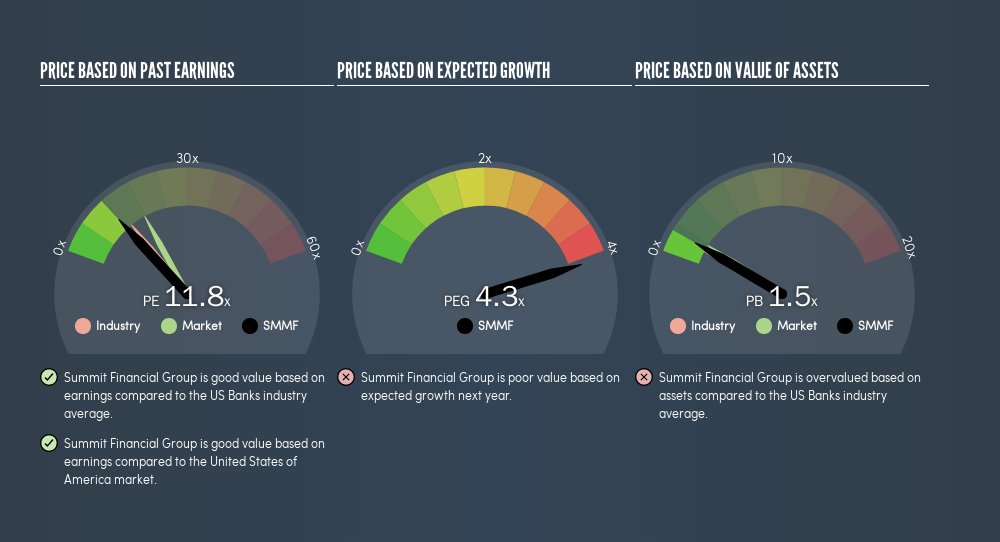- United States
- /
- Banks
- /
- NasdaqGS:SMMF
Is Summit Financial Group, Inc.'s (NASDAQ:SMMF) P/E Ratio Really That Good?

This article is written for those who want to get better at using price to earnings ratios (P/E ratios). We'll look at Summit Financial Group, Inc.'s (NASDAQ:SMMF) P/E ratio and reflect on what it tells us about the company's share price. Summit Financial Group has a P/E ratio of 11.81, based on the last twelve months. That corresponds to an earnings yield of approximately 8.5%.
View our latest analysis for Summit Financial Group
How Do You Calculate A P/E Ratio?
The formula for P/E is:
Price to Earnings Ratio = Price per Share ÷ Earnings per Share (EPS)
Or for Summit Financial Group:
P/E of 11.81 = $26.81 ÷ $2.27 (Based on the trailing twelve months to December 2018.)
Is A High Price-to-Earnings Ratio Good?
A higher P/E ratio means that buyers have to pay a higher price for each $1 the company has earned over the last year. That isn't a good or a bad thing on its own, but a high P/E means that buyers have a higher opinion of the business's prospects, relative to stocks with a lower P/E.
How Growth Rates Impact P/E Ratios
Earnings growth rates have a big influence on P/E ratios. When earnings grow, the 'E' increases, over time. That means even if the current P/E is high, it will reduce over time if the share price stays flat. So while a stock may look expensive based on past earnings, it could be cheap based on future earnings.
It's nice to see that Summit Financial Group grew EPS by a stonking 127% in the last year. And it has bolstered its earnings per share by 6.9% per year over the last five years. I'd therefore be a little surprised if its P/E ratio was not relatively high.
How Does Summit Financial Group's P/E Ratio Compare To Its Peers?
The P/E ratio essentially measures market expectations of a company. If you look at the image below, you can see Summit Financial Group has a lower P/E than the average (13.2) in the banks industry classification.

This suggests that market participants think Summit Financial Group will underperform other companies in its industry. While current expectations are low, the stock could be undervalued if the situation is better than the market assumes. If you consider the stock interesting, further research is recommended. For example, I often monitor director buying and selling.
Remember: P/E Ratios Don't Consider The Balance Sheet
It's important to note that the P/E ratio considers the market capitalization, not the enterprise value. Thus, the metric does not reflect cash or debt held by the company. Hypothetically, a company could reduce its future P/E ratio by spending its cash (or taking on debt) to achieve higher earnings.
Spending on growth might be good or bad a few years later, but the point is that the P/E ratio does not account for the option (or lack thereof).
How Does Summit Financial Group's Debt Impact Its P/E Ratio?
Summit Financial Group has net debt worth 79% of its market capitalization. This is enough debt that you'd have to make some adjustments before using the P/E ratio to compare it to a company with net cash.
The Verdict On Summit Financial Group's P/E Ratio
Summit Financial Group's P/E is 11.8 which is below average (17.7) in the US market. The company has a meaningful amount of debt on the balance sheet, but that should not eclipse the solid earnings growth. The low P/E ratio suggests current market expectations are muted, implying these levels of growth will not continue.
Investors should be looking to buy stocks that the market is wrong about. As value investor Benjamin Graham famously said, 'In the short run, the market is a voting machine but in the long run, it is a weighing machine.' So this freevisualization of the analyst consensus on future earnings could help you make the right decision about whether to buy, sell, or hold.
Of course you might be able to find a better stock than Summit Financial Group. So you may wish to see this freecollection of other companies that have grown earnings strongly.
We aim to bring you long-term focused research analysis driven by fundamental data. Note that our analysis may not factor in the latest price-sensitive company announcements or qualitative material.
If you spot an error that warrants correction, please contact the editor at editorial-team@simplywallst.com. This article by Simply Wall St is general in nature. It does not constitute a recommendation to buy or sell any stock, and does not take account of your objectives, or your financial situation. Simply Wall St has no position in the stocks mentioned. Thank you for reading.
About NasdaqGS:SMMF
Summit Financial Group
Summit Financial Group, Inc. operates as a financial holding company for Summit Community Bank, Inc.
Flawless balance sheet and undervalued.
Similar Companies
Market Insights
Community Narratives





